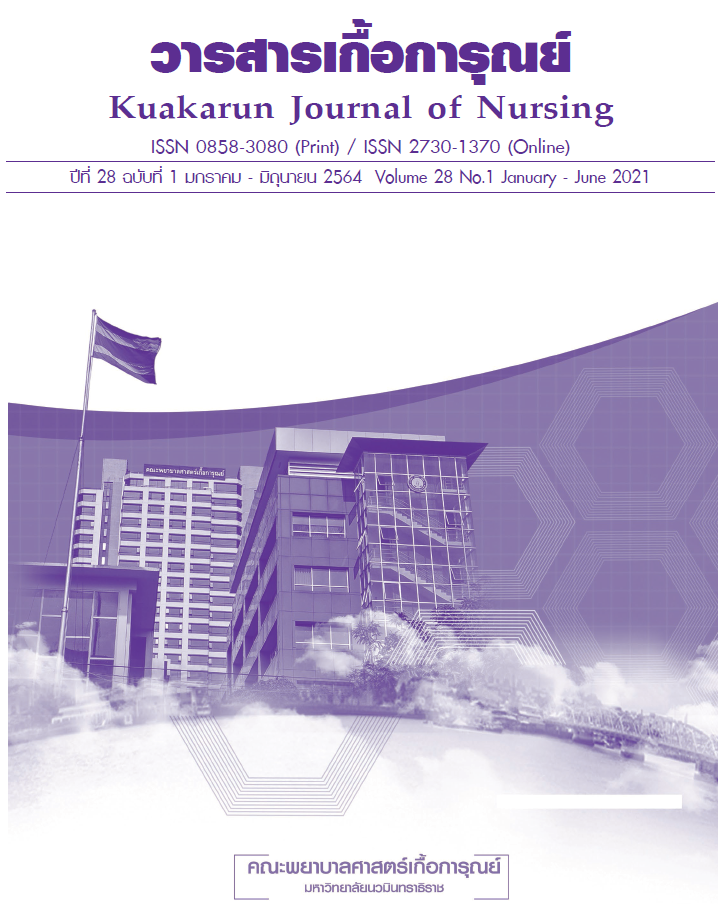การเปรียบเทียบพฤติกรรมการดูดนมมารดาและอัตราการดูดนม ของทารกเกิดก่อนกำหนดที่ดูดเต้านมเปล่าในจำนวนครั้งที่ต่างกัน
คำสำคัญ:
การดูดเต้านมเปล่า, พฤติกรรมการดูดนมมารดา, อัตราการดูดนมบทคัดย่อ
การวิจัยเชิงทดลองชนิดสองกลุ่มแบบวัดผลก่อนและหลังการทดลอง มีวัตถุประสงค์เพื่อเปรียบเทียบพฤติกรรมการดูดนมมารดา และอัตราการดูดนมของทารกเกิดก่อนกำหนดที่ดูดเต้านมเปล่า 4 ครั้งต่อวัน กับทารกเกิดก่อนกำหนดที่ดูดเต้านมเปล่า 2 ครั้งต่อวัน กลุ่มตัวอย่างคือ มารดาและทารกเกิดก่อนกำหนดที่มีอายุหลังปฏิสนธิ 34 - 36 สัปดาห์ ที่เข้ารับการรักษาในแผนกทารกแรกเกิดกึ่งวิกฤตคณะแพทยศาสตร์วชิรพยาบาล มหาวิทยาลัยนวมินทราธิราช จำนวน 22 คู่ แบ่งเป็นกลุ่มละ 11 คู่ ด้วยวิธีจับฉลากแบบไม่แทนที่ กลุ่มทดลองได้ดูดเต้านมเปล่า 4 ครั้งต่อวัน ส่วนกลุ่มเปรียบเทียบได้ดูดเต้านมเปล่า 2 ครั้งต่อวัน โดยทั้งสองกลุ่มดูดเต้านมเปล่าติดต่อกัน 7 วัน ประเมินพฤติกรรมการดูดนมมารดาโดยใช้แบบประเมินพฤติกรรมการดูดนมมารดาของทารกเกิดก่อนกำหนด ซึ่งผ่านการตรวจสอบความตรงเชิงเนื้อหา และมีค่าความตรงกันระหว่างผู้สังเกตเท่ากับร้อยละ 92.00 ประเมินอัตราการดูดนมของทารกด้วยแบบบันทึกปริมาณนมที่ทารกดูดได้ วิเคราะห์ข้อมูลโดยใช้สถิติทดสอบ แมน-วิทนีย์ ยู
ผลการศึกษา พบว่า กลุ่มทดลองมีคะแนนพฤติกรรมการดูดนมมารดาหลังการทดลองดีกว่ากลุ่มเปรียบเทียบอย่างมีนัยสำคัญทางสถิติ (p-value < .05) แต่กลุ่มทดลองกับกลุ่มเปรียบเทียบมีอัตราการดูดนมแตกต่างกันอย่างไม่มีนัยสำคัญทางสถิติ (p-value > .05) ข้อเสนอแนะจากการวิจัย ควรมีการศึกษาซ้ำในขนาดกลุ่มตัวอย่างที่ใหญ่ขึ้น และควรเพิ่มจำนวนวันของการดูดเต้านมเปล่าให้นานขึ้น เพื่อเปรียบเทียบอัตราการดูดนมของทารกเกิดก่อนกำหนดที่ดูดเต้านมเปล่า 4 ครั้งต่อวัน กับทารกเกิดก่อนกำหนดที่ ดูดเต้านมเปล่า 2 ครั้งต่อวัน
เอกสารอ้างอิง
Barlow SM. Oral and respiratory control for preterm feeding. Current Opinion in Otolaryngology & Head and Neck Surgery 2009;17(3):179-86.
Payakkaraung S. Practice guideline for breastfeeding: common problems in infants. In: Vichitsukon K, Sangperm P, Watthayu N, Ruangjiratain S, Payakkaraung S, editors. Breastfeeding. Bangkok: Pre-one; 2014. p. 2-30. (in Thai)
Pinelli J, Symington AJ. Non-nutritive sucking for promoting physiologic stability and nutrition in preterm infants (review). New Jersey: John Wiley & Sons; 2009.
Lerthamtewe W. Nursing care of the newborn with respiratory distress. In: Musiksukont S, Tilokskulchai F, Lerthamtewe W, Sukcharoen B, Preungvate O, Sangperm P, et al, editors. Pediatric nursing. 2nd ed. Bangkok: Sahamit Printing and Publishing; 2015. p. 409-30. (in Thai)
Pickler RH, Best A, Crosson D. The effect of feeding experience on clinical outcomes in preterm infants. Journal of Perinatology 2009;29(2):124-9.
Barlow SM, Harold MP, Zimmerman E, Finan D. Feeding skills in the preterm infant. The American Speech-Language-Hearing Association Leader 2010;15(7):22-3.
Spatz DL. Development and application of ten steps for promoting and protecting breastfeeding in sick babies. Oral session presented at: international conference on “Breastfeeding sick babies”. 2013 Jan 22-24; Sukosol Hotel, Bangkok. (in Thai)
Papana N. Effect of pacifier sucking during orogastric on the preterm infant's breastfeeding behaviors [Dissertation]. Chiang Mai: Chiang Mai University; 2009. (in Thai)
Inthayote K. Effect of emptied breast sucking on breastfeeding behaviors of preterm infants receiving orogastric tube feeding [Dissertation]. Chiang Mai: Chiang Mai University; 2010. (in Thai)
Chunpia C. Anatomy and physiology of lactation and mechanism of sucking. In: Vichitsukon K, Sangperm P, Watthayu N, Ruangjiratain S, Payakkaraung S, editors. Breastfeeding. Bangkok: Mahidol University; 2014. p. 63-94. (in Thai)
Tahvornwattana S. Breastfeeding preterm baby. Poster at: The 4th brestfeeding sick babies internationnal conference; 2013 Jun 5-7; Miracle grand convention hotel, Bangkok. (in Thai)
Boonchalerm P, Prasopkittikun T, Sangperm P, Jirasakuldej W. Effects of the mother-preterm infant preparation program on breastfeeding self-efficacy and sucking quality. Journal of Nursing Science 2012;30(4):61-71. (in Thai)
Jones LR. Oral feeding readiness in the neonatal intensive care unit. Neonatal Network 2012;31(3):148-55.
Bingham PM, Ashikaga T, Abbasi S. Relationship of behavioral state and tube-feeding to non-nutritive sucking in premature infants. Journal of Neonatal Nursing 2011;17(4):150-7.
Kamhawy H, Diane HD, Alsharkawy S, Alrafay S, Corazzini K. Non-nutritive sucking for preterm infants in Egypt. Journal of Obstetric Gynecologic and Neonatal Nursing 2014;43(3):330-40.
Sangperm P. Breastfeeding in high-risk infants. In: Thampanichawat W, Rungamornrat S, Payakkaraung S, editors. Nursing in high-risk infants. Bangkok: Pre-one; 2016. p.78-92. (in Thai)

















